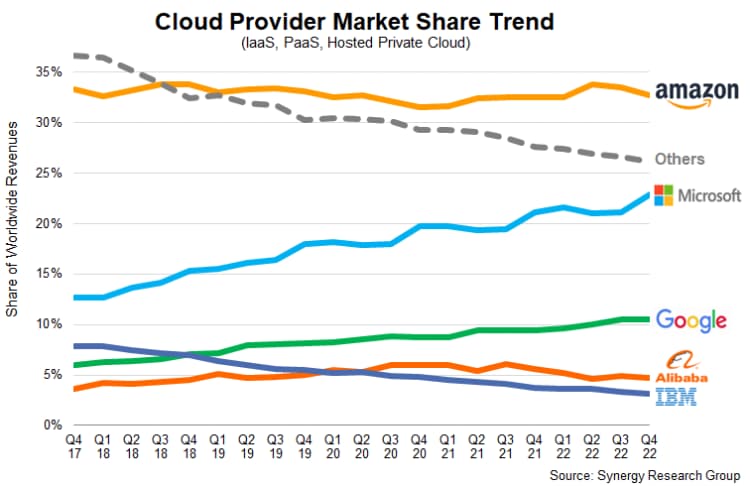AWS vs Azure vs Google Cloud
In today's fast-paced digital landscape, cloud computing has become the backbone of many businesses, offering scalability, reliability, and cost-effectiveness. Three major players in the cloud industry are Amazon Web Services (AWS), Microsoft Azure, and Google Cloud Platform (GCP).
1. Market Share and Adoption
Market Share (as of 2023)
- AWS: 32.4%
- Azure: 20.7%
- GCP: 9.5%

Adoption by Industry
| Industry | AWS | Azure | GCP |
|---|---|---|---|
| Retail | 32% | 18% | 8% |
| Financial | 28% | 19% | 9% |
| Healthcare | 26% | 15% | 8% |
| Government | 33% | 20% | 7% |
| Gaming | 35% | 19% | 10% |
Source: Flexera 2021 State of the Cloud Report
2. Service Offerings
All three platforms offer a comprehensive suite of services, including:
- Compute Services:
- AWS: EC2, Lambda, Elastic Beanstalk
- Azure: Virtual Machines, Azure Functions, App Service
- GCP: Compute Engine, Cloud Functions, App Engine
- Storage Services:
- AWS: S3, EBS, Glacier
- Azure: Blob Storage, Managed Disks, Azure Files
- GCP: Cloud Storage, Persistent Disks, Cloud Filestore
- Databases:
- AWS: RDS, DynamoDB, Aurora
- Azure: Azure SQL Database, Cosmos DB, SQL Server on VMs
- GCP: Cloud SQL, Firestore, Bigtable
- AI and Machine Learning:
- AWS: SageMaker, Rekognition, Comprehend
- Azure: Azure ML, Cognitive Services, Databricks
- GCP: AI Platform, Vision AI, NLP
3. Pricing and Cost Management
Price Structure
- AWS: Pay-as-you-go, reserved instances, spot instances.
- Azure: Pay-as-you-go, reserved instances, hybrid benefits.
- GCP: Pay-as-you-go, committed use, sustained use.
Comparative Pricing for Standard Virtual Machines (as of 2021)
| VM Type | AWS (Linux) | Azure (Linux) | GCP (Linux) |
|---|---|---|---|
| Standard B2s | $0.034/hour | $0.032/hour | $0.031/hour |
| Standard D2s | $0.226/hour | $0.175/hour | $0.169/hour |
| Standard F2s | $0.080/hour | $0.064/hour | $0.052/hour |
Source: Cloud Provider Websites
Cost Management Tools
- AWS: AWS Cost Explorer, AWS Budgets, Trusted Advisor.
- Azure: Azure Cost Management and Billing, Azure Advisor, Azure Budgets.
- GCP: Google Cloud Cost Management, Billing Reports, Cost Forecasting.
4. Network and Security
- Network Services:
- AWS: VPC, CloudFront, Route 53
- Azure: Virtual Network, CDN, Azure DNS
- GCP: VPC, Cloud CDN, Cloud DNS
- Security Services:
- AWS: IAM, KMS, WAF
- Azure: Azure Active Directory, Key Vault, Azure Firewall
- GCP: Identity-Aware Proxy, Cloud HSM, Cloud Armor
- Compliance and Certifications:
- AWS: ISO 27001, SOC 2, HIPAA
- Azure: ISO 27001, SOC 2, HIPAA
- GCP: ISO 27001, SOC 2, HIPAA
5. Performance and Scalability
- Performance:
- AWS: Strong global presence with low latency.
- Azure: Robust network, competitive performance.
- GCP: Emphasis on high-speed connections.
- Scalability:
- AWS: Auto Scaling, Elastic Load Balancing.
- Azure: Azure Autoscale, Azure Load Balancer.
- GCP: Managed Instance Groups, Load Balancing.
Conclusion
Choosing the right cloud provider depends on your specific business needs, budget, and existing technology stack. AWS, Azure, and GCP each offer a wide range of services, robust security, and global reach. Analyzing factors like market share, adoption, pricing, services, and performance can help you make an informed decision.
Remember, it's advisable to conduct a thorough cost analysis based on your specific use case before making a final decision. Additionally, considering factors like support, community, and integration with existing systems is crucial for a seamless transition to the cloud.
